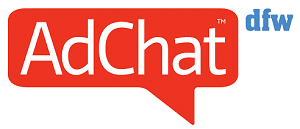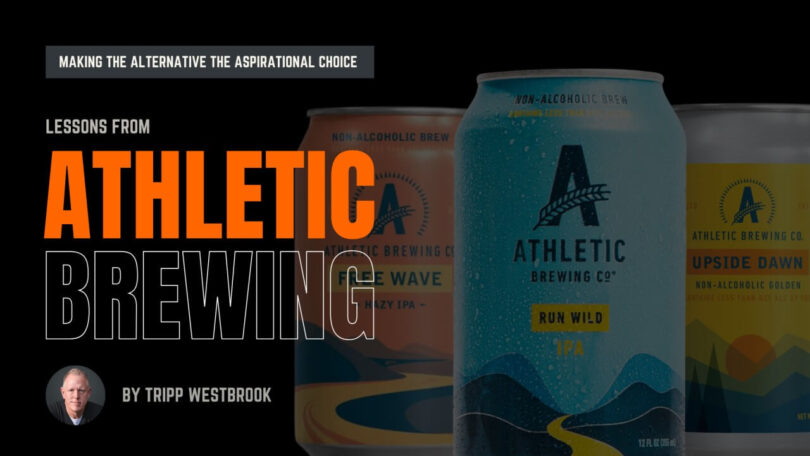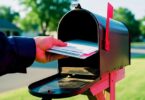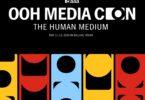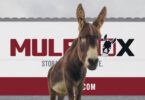How they repositioned alcohol-free products from category irrelevancy to aspirational choice for health-conscious beer lovers.
During Prohibition, it was called “near beer.” Brewers like Anheuser Busch and Pabst would make regular beer, then boil off the alcohol—and the flavor. Non-alcoholic (NA) beer has been around a long time in America but always had a rap of being a fake, tasteless version of the real thing. Conventional thinking had relegated NA beer to a second-rate choice suitable for wowsers and designated drivers. Enter Bill Shufelt.
For the Athletic Brewing Company co-founder, the concept of a non-alcoholic beer company wasn’t even on his radar until he got a hard whack on the shoulder from his wife, Jacqueline, after she had tired of hearing the same complaint. Despite going alcohol-free at the time, he still loved dinner and drinks and there were few options that satisfied him. “They’d say, ‘A diet soda or water?’ It would ruin the meal,” Shufelt told The Times.
“You should fix it,” Jacqueline said.

Shufelt’s great insight was to see non-alcoholic beer’s image and taste problem as an opportunity to redefine the segment. Instead of positioning it as a compromise, he exploited the industry white-space and built the brand into an aspirational choice for health-conscious beer lovers—starting with the name and making sure the product tasted as good as full-strength beers. In the process, he swept aside a lot of skepticism and stigma.
“Non-alcoholic beer was always this penalty box thing you drank when you weren’t really part of the occasion,” Shufelt says. “And we wanted to bring it to the totally next level and make ‘Athletic’ an awesome, fun word that people could be proud of.”
Breaking Convention Breaks New Ground
Today, Athletic Brewing has an $800 million valuation, is a globally recognized brand, and is Whole Foods’ best-selling beer of any kind. Shufelt’s success has corresponded with the emergence of the “sober curious” culture—and a deeper questioning of the downsides of alcohol after the disruption of the pandemic.
As a commercial leader of this movement, Athletic has done what “near beer” could have never achieved—help prop up declining sales in the broader beer market by making its product taste like the real deal without the hangover. Let’s look at where it began and how Shufelt got there.
From Wall Street to Gatorade Jugs
As a Wall Street trader, Shufelt lived the lifestyle—6am starts, 12-hour days, followed by work dinners and drinks. He was burning the candle at both ends and assumed that everybody drank like he did—not to excess, but regularly. It was only when he gave up drinking to train for an ultramarathon that the benefits became obvious: better sleep, sharper thinking, and renewed intellectual curiosity.
“About only 50% of adults consume alcohol on a regular basis, and the breadth of non-alcoholic options for high-performing adults was super limited,” the Athletic CEO told Forbes. “It’s actually a very small percentage of the population that consumes a majority of the alcohol. So as I was in these places, bars and restaurants, looking for better options, I realized that there were a lot of people like me.”
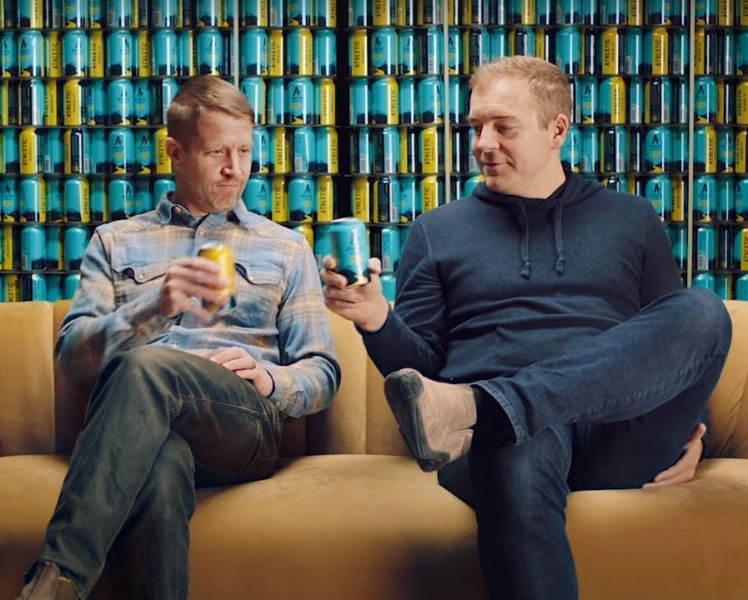
Soon, Shufelt started running his own surveys. Although the NA beer market in 2016-17 was 0.3% of the overall beer market in the U.S., 55% said they would drink great non-alcoholic beer regularly if it didn’t come with bad taste and negative associations. The issue was that by burning off the alcohol, traditional brewing methods created a bland, watery product.

Getting Serious
After Shufelt quit his job to pursue his vision in 2017, he faced hundreds of rejections before meeting John Walker, an award-winning brewer and soon-to-become fellow NA beer evangelist. They started experimenting by using Gatorade jugs for test batches in a very basic warehouse.
As Walker told InsideHook, that’s where they took over nine months to develop a proprietary process that creates fully fermented beer under 0.5% alcohol by volume (ABV)—the industry threshold for non-alcoholic beverages—without removing alcohol afterward.

The Sober Curious Market
The founders built an early following through grassroots marketing, going door-to-door with retailers and meeting athletes at race finish lines. After perfecting their process with over 100 test batches, they built their first brewery in Stratford, Connecticut. What Walker did differently was focus on the ingredients and the brewing method, instead of just removing alcohol.
As Athletic’s beers began winning awards against full-strength competitors, the company expanded to a larger facility in nearby Milford, then added West Coast production in San Diego. That’s the synopsis but this growth involved a lot of trial and error. The founders were rebuffed by many early potential investors but Shufelt maintained trust in his own research.
Last year, non-alcoholic beer sales reached $368.7 million, up almost 30% from 2023, with case sales rising 20.3%.
While over half of buyers are 55-plus, 23% are millennials, and the segment increasingly attracts fitness-oriented consumers. Named on the TIME100 Most Influential Companies 2024 list, Athletic has nearly doubled its NA market share since 2022, passing both Heineken 0.0 and Bud Zero.
To this day, Shufelt challenges skeptics to take the “six-pack test”: put half a dozen of Athletic’s IPAs, lagers, or stouts in the fridge next to full-strength beverages and watch how fast the non-alcoholic version disappears. Just as the “sober curious” movement emphasizes mindfulness over when and how people drink, Athletic is trading on choice and moderation rather than total abstinence.
Brewing a Better Tomorrow
Bill told John at the outset they were never ever going to put a product on the shelf that wasn’t just great non-alcoholic beer, but great beer, period. Athletic has since built on that concept to “to create a movement” that includes a strong vein of social responsibility. Every employee becomes an owner on day one, their Two for the Trails program invests up to $2 million annually in local conservation, and they are now a certified B Corp.

When reading Athletic’s story, I have had to remind myself this is a company that first sought backers without a proof of concept. The founders have since shown that rejection and resistance may well be inevitable when you dare to break the mold on the road to future success.
Kudos to Shufelt and Walker
Athletic recently penned a deal with the Arsenal football club (of which I’m a huge fan) to supply Run Wild IPA at Emirates Stadium in London, while also becoming the first non-alcoholic beer sold in-flight by a U.S. airline through JetBlue. That’s big business. Bill and John swam upstream and challenged the long standing convention that NA beer had to be tasteless -to truly amazing results. I want to congratulate them both for not just building a great company, but helping shift drinking culture in America and now around the world for the greater good. Bill Shufelt, John Walker, Andrew Katz, Alex B., Evan Zawatsky, Madison Sudano Weaver, Chris F.. All images: Athletic Brewing.
